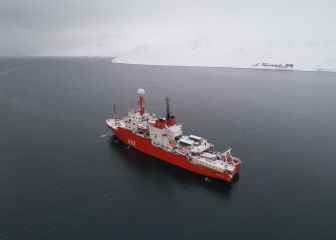The “rivers of heaven” precipitated the heat that caused the 1,200 square kilometer ice shelf –the size of los angeles– will collapse in Antarctica in March. A study published in the journal Nature Communications Earth & Environment states that intense atmospheric rivers weaken the stability of ice shelves on the Antarctic Peninsula. Based on analysis using algorithms, climate models and satellite observations, the 60% of abruption episodes of the Antarctic Peninsula were caused by atmospheric rivers between the years 2000 and 2020.
What are the ‘rivers of heaven’?
The “rivers of heaven” –or atmospheric rivers– are columns of humidity that transport hot air and water vapor from the tropics to other parts of the Earth. These “rivers” discharge rain and snow when they hit the land.
What are the consequences of this phenomenon?
These plumes of moisture cause ttemperature extremes, surface melting, sea ice breakup o destabilization of ice shelves with a 40% chance. Thus, there is a greater loss of continental ice and the consequent rise in sea level.
“What our study found was that all these different aspects are caused actually by atmospheric rivers, especially intense ones,” one of the lead authors of the study told CNNJonathan Wille, of the Grenoble Alpes University, France.
In addition, according to the projections of the study, the Larsen C ice shelf –fourth largest ice shelf on the continent and the largest in its region– runs the risk of suffering such a collapse. In 1995 and 2002, the Larsen A and B platforms fell, respectively, due to “sky rivers”.
Is there a relationship with climate change?
The scientists they still don’t know what relationship there may be between atmospheric rivers and climate change, but the recent heat wave and conditions in Antarctica at the time were so extreme that experts hypothesize that the climate crisis has some kind of link with the phenomenon.
Will atmospheric rivers occur more frequently?
Experts do not have consistent evidence that there will be a greater number of atmospheric rivers, because the analyzes are giving different results. Professor of polar observation and modeling at University College London Julienne Stroeve told CNN that it is too soon to say yes they will happen more oftenso it is an unknown at the moment.
However, there are experts who point out that the more the atmosphere warms, the more capacity there is to retain moisture, so that vapor transport –by means of atmospheric rivers– would increase. Therefore, this process may not occur more frequently, but they will be more intense and would cause more destabilization.
